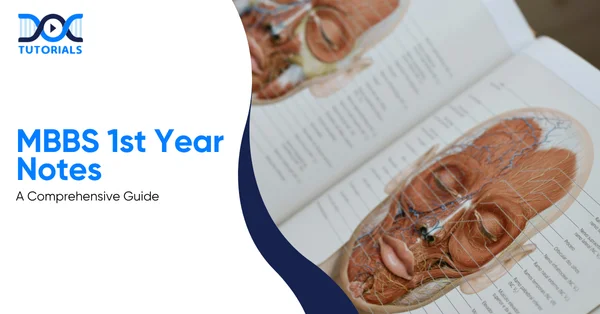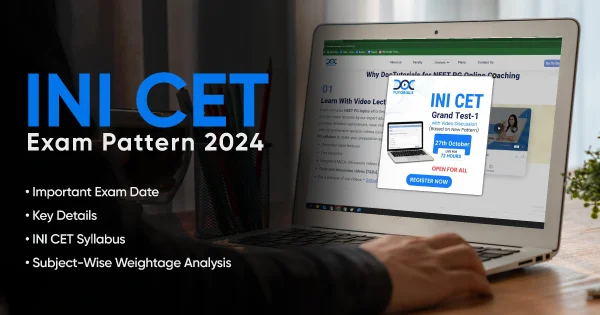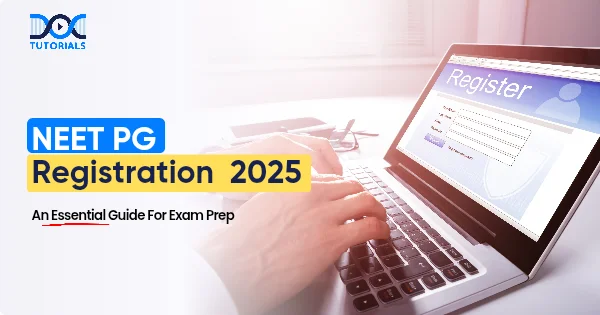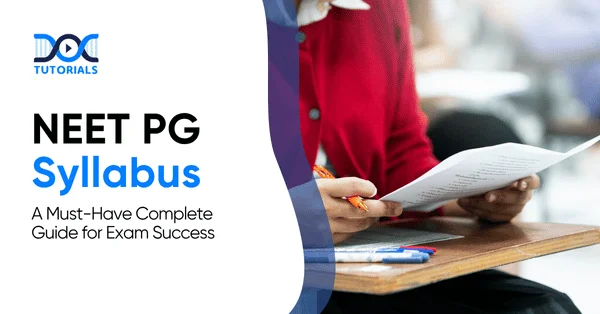MBBS 1st Year Notes: A Comprehensive Guide

The first year of MBBS is the most crucial period for a medical student, marking the commencement of their medical journey. In this period, the students learn introductory preclinical courses, such as Anatomy, Physiology, and Biochemistry. A proper understanding of these fundamentals is critical towards advancement into medical practice in future.
A strong foundation enables students not only to get through the MBBS exam but also to excel in advanced subjects such as Pathology and Pharmacology. The importance of academic success and a promising medical career depends on consistent academic study and revision.
In this guide, we will explore the significance of MBBS 1st year notes, how to utilise them effectively, and the most valuable resources for supporting your studies. Keep reading for a detailed insight.
Why are MBBS 1st Year Notes Important?
Ever tried to construct a house without a blueprint? This is what it feels like to study MBBS without organised notes. Here’s why these notes matter:
- Simplify Complex Concepts
There are complicated terms, processes, and mechanisms associated with medical subjects. To simplify complex concepts, a well-written note can break them down into comprehensible language.
- Save Time
The time you spend needlessly leafing through two or three textbooks is better spent on proper notes, which contain all the most critical points in a single place, helping you revise faster.
- Improve Knowledge Retention
Ever studied a chapter overnight before an exam, only to forget it hours later? Some notes, summarised and pictorially illustrated, enable you to remember longer.
- Clear Focus on Important Topics
Not all information in textbooks is vital in exams. Properly arranged notes are those that highlight high-yielding areas, helping you focus on what truly matters to you.
What Makes the MBBS 1st Year Notes More Effective?
Not every note is created equal. There are disorganised ones, some of them old and unfinished. What makes a set of notes effective and useful is as follows:
- Clarity
Clarity of study notes implies presenting information in a straightforward and easy-to-comprehend format without a lot of technical language. This eases complicated medical terms, particularly among first-year students.
- Concise Content
Concise content aims to deliver the main idea and essential facts instead of having all available details. This will help students focus on the most relevant information to include in the exams and practical knowledge.
- Visual Aids
Drawing images, flowcharts, and tables is significant in the simplification of complex processes. Sometimes, a graph can illustrate a point better and faster than a substantial portion of a text.
- Updated Syllabus
It is essential to keep the notes indexed with a changed syllabus, since medical knowledge and exam patterns keep changing. The new notes can be used to ensure that students access information that is not only up-to-date but also relevant to their university needs.
How to Make the Most of Your MBBS First Year Notes?
Simply having notes won’t make you top of the class. You need to use them smartly. Here are practical tips to get the best results:
1. Active Reading
Active reading involves engaging with the study material by highlighting important points, writing brief annotations in the margins, and summarising complex topics in one’s own words. This approach helps in better understanding and retention of complex concepts.
2. Regular Revision
Regular revision plays a key role in strengthening memory and reinforcing knowledge. Revisiting notes periodically allows the brain to retain information more effectively over time, making recall easier during exams.
3. Practice Questions
Practice questions serve as an effective way to assess understanding of studied topics. Working through question banks that reflect real exam patterns helps students identify knowledge gaps and improve their problem-solving skills.
4. Group Study
Group study provides an opportunity for collaborative learning, where discussing challenging topics with peers can lead to a deeper understanding. Explaining concepts to others often helps clarify one’s own knowledge and offers new perspectives.
Tips for Choosing the Best 1st Year MBBS Notes
Finding reliable notes can be tricky. Here’s what you should check before choosing:
| Factors | Why It Matters |
| Source Credibility | Always choose notes from trusted sources like DocTutorials or reputed medical educators. |
| Syllabus Alignment | The notes must cover every topic your university requires. Otherwise, you might miss essential chapters. |
| Peer Recommendations | Ask seniors or batchmates for suggestions. Personal experience matters a lot as well. |
| Trial Versions | Some platforms offer sample notes. Check those before committing to full access. |
What are the Other Resources to Boost Your Study?
Your 1st year MBBS notes are a powerful tool, but don’t stop there. Combine them with other valuable resources, such as the following:
- Standard Textbooks
Standard textbooks are widely regarded for providing in-depth explanations and comprehensive coverage of core medical concepts. They serve as essential resources for a detailed understanding of human anatomy and physiological processes.
- Online Lectures
Online lectures available on a few platforms offer simplified video explanations of challenging medical topics. These visual resources help break down complex subjects into easily digestible lessons, which are especially helpful for visual learners.
- Question Banks
Question banks designed for medical students provide extensive practice material that mirrors actual exam patterns. Certain apps compile large sets of MCQs and case-based questions, allowing students to practice regularly and assess their preparation.
- Study Apps
Study applications offer tools for fast memorisation through flashcards and interactive quizzes. These apps are helpful for quick revision and reinforcing key concepts on the go.
How Does DocTutorials Help You Succeed in Your MBBS Exam?
If you’re looking for the best 1st year MBBS notes, DocTutorials is a top choice. Here’s why:
- Regularly Updated & Comprehensive Notes
Well-structured and regularly updated MBBS first-year notes are designed to align with the latest medical curriculum. They include a comprehensive coverage of the basic subjects, and they must be clear and precise to reflect current academic requirements.
- Focus on Concepts, Not Rote Learning
These notes emphasise understanding concepts rather than rote memorisation. Rather than memorising processes such as renal filtration, it is about explaining why every step is taking place, thereby enabling the students to develop a solid conceptual base, which reinforces their deeper learning.
- Visual Learning Made Easy
Complex subjects, such as neuro-muscular transmission and metabolic pathways, are explained using images in the form of detailed diagrams, flowcharts, and tabular representations. Complex concepts become easier to understand and remember with the help of these visual means.
- Exam-Oriented Approach
Exam-oriented practices are based on high-yield concepts, which are repeatedly tested through a large number of practice questions and case studies that simulate the real exam pattern. The strategy would guide the students to concentrate on the issues that are most important in getting a high score.
- Easy Access Anytime, Anywhere
Access your notes anytime, anywhere—ideal for making the most of your busy MBBS schedule!
- Expert-Curated Content
Experienced medical educators prepare all notes. You get accurate, reliable, and structured notes that save you from wasting time searching for helpful resources.
FAQs about MBBS 1st Year Notes
- Which is better: handwritten or digital MBBS 1st year notes?
Both handwritten and digital notes have their advantages. Handwritten notes help improve memory retention and promote active learning. Digital notes (PDFs) are easy to access, well-organised, searchable, and often include diagrams and practice questions. The most effective approach is to use a combination of both methods.
- Can I rely on online MBBS 1st year notes for practical knowledge?
Online MBBS first-year notes are excellent for understanding theoretical concepts. However, they do not always cover practical skills such as dissection techniques or lab procedures. It is essential to complement these notes with hands-on learning by attending practical classes, using detailed textbooks, or watching video tutorials.
- What subjects are covered in the MBBS 1st year notes?
MBBS 1st year notes mainly cover three core subjects:
- Anatomy – The structure of organs, muscles, bones, and blood vessels.
- Physiology – How the body functions, including circulation, nerve impulses, and respiration.
- Biochemistry – Chemical processes inside cells, metabolism, and genetic mechanisms.
- How frequently should I revise MBBS 1st year notes for the best results?
Regular and consistent revision is crucial for long-term retention. Ideally, you should revise each topic:
- Right after studying it the first time
- After a few days, using spaced repetition
- Just before exams to reinforce memory
This approach helps improve understanding and exam performance.
- How can I organise my MBBS 1st year notes for better revision?
To organise your MBBS 1st year notes effectively:
- Divide them by subjects and chapters.
- Highlight key concepts using colour codes.
- Include diagrams, tables, and flowcharts for quick understanding.
- Create a revision schedule to ensure regular review of topics.
Conclusion
Having access to quality 1st year MBBS notes is indispensable for your success in the first year of medical school. This clarity allows you to plan your study strategy more efficiently and focus on high-yield topics without feeling overwhelmed.
Thoroughly familiarise yourself with the syllabus and regularly revise your notes to reinforce your understanding. DocTutorials help you with organised, concept-focused notes that simplify learning and help you concentrate on critical areas. Enhance your study with case studies, MCQs, diagrams, and mnemonics to simplify complex concepts.
Join DocTutorials and explore our MBBS course to excel in your medical exam!
Latest Blogs
-

INI CET Exam Pattern 2025: A Complete Guide with Subject-Wise Weightage
The Institute of National Importance Combined Entrance Test (INI CET) is your key to entering some of the most prestigious…
-

NEET PG Registration 2025: An Essential Guide For Exam Prep
The NEET PG registration, which is conducted online, is a crucial step in the exam process. Filling out the NEET…
-

NEET PG Syllabus 2026: A Must-Have Complete Guide for Exam Success
The NEET PG Syllabus acts as one of the foundation stones for aspiring postgraduate medical students like you who are…




